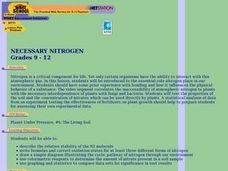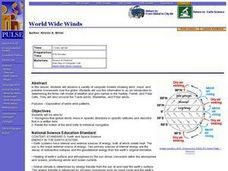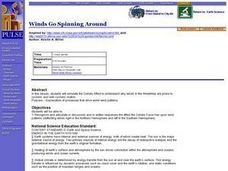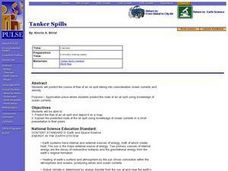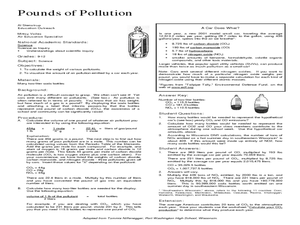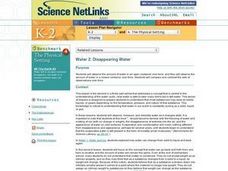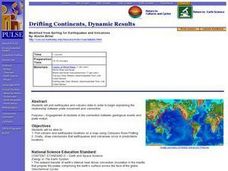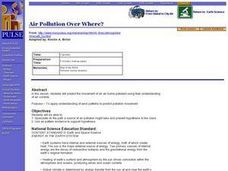Curated OER
Necessary Nitrogen
Students view a video that presents the biogeochemical cycle of nitrogen. They compare types of soils and consider how different fertilizers affect soil composition.
Curated OER
World Wide Winds
Students recognize that global winds move in specific directions in specific latitudes and describe that in a written form. They relate the motion of the wind belts to historical navigation.
Curated OER
Winds Go Spinning Around
High schoolers simulate the Coriolis Effect to comprehend why winds in the Westerlies are prone to cyclonic and anti-cyclonic motion. They arrive at an explanation of processes that drive world wind patterns
Curated OER
Tanker Spills
Students predict the flow of an oil spill and depict it on a map. They explain the predicted route of the oil spill using knowledge of ocean currents in a short presentation to their peers.
Curated OER
How Does a Liquid Become a Solid?
Students explore the energy changes from a liquid to a solid. They model the arrangement of a solid and the change in states due to changes in energy using desks and chairs. Assessment questions are provided in lesson plan.
Curated OER
Ozone Pollution- Smog Alert
Students explore ozone pollution. In this ozone pollution activity, students participate in an experiment to simulate smog by using matches, foil, and a covered jar. Students observe how smog effects the environment.
Curated OER
Survival Still
Students explain how to desalinate water using solar energy. In this solar lesson students complete a lab activity and explain capillary water.
Curated OER
Changing States of Matter - Making Ice Cream
Students make ice cream as a result of viewing changes of states of matter. In this matter lesson plan, students learn how heating and cooling can effect a state of matter to change.
Curated OER
Evaporation and Condensation
Students explore how temperature effects the processes of evaporation and condensation and how the air may be polluted by the evaporation of certain compounds. In this temperature lesson students complete a lab and a worksheet.
Curated OER
Classifying Matter Game
Students identify the different states of matter. In this chemistry lesson, students differentiate the physical properties of the three states. They apply what they learned by playing a team game at the end of the lesson.
Curated OER
How Do Airplanes Stay off the Ground?
Students use balloons and string to duplicate Bernoulli's Principle of wing shape and its affect on liftoff.
Curated OER
Coefficient of Kinetic Friction and Surface Area
Students investigate coefficient of friction with respect to surface area and applied force in contact with the sliding force.
Curated OER
Learning Lesson: Sweatin' to the Coldies
Students participate in a demonstration to show the change of water vapor to a liquid. They discuss the three states of matter. They examine flash flood safety to end the lesson.
Curated OER
Atoms, Kinetic Theory, Solids and Fluids
Students identify and describe the building blocks that make up an atom. They also compare the ages of atoms to the ages of the materials they compose,as well as, give examples that illustrate the small size of atoms.
Curated OER
What Do Concentrations Mean?
Pupils investigate the concept of climate gases and practice using the appropriate measurement terms. The lesson includes information that is used by the teacher to conduct class discussion or as a source of background for students.
Curated OER
Ozone Pollution: Smog Alert
Students simulate the development of smog. They discover how it forms naturally in nature. They read news articles about the ozone and pollution. They discuss what they can do to lower the pollution they generate.
Curated OER
Pounds of Pollution
Students examine pollutants and investigate air pollution emitted by a car in a year. In this air pollution lesson plan students complete an activity and make calculations.
Curated OER
Energy of Activation
Young scholars determine the activation energy of a chemical reaction.
Curated OER
Aurora Borealis
Students discuss what causes the northern lights and the folklore attached to them. They discuss magnetic fields, and use various common materials to discover if ions conduct electricity.
Curated OER
Ozone Pollution: Smog Alert
Students explain ozone pollution and make them aware of how it is formed. They simulate the development of smog and infer how it occurs in nature.
Curated OER
Water 2: Disappearing Water
Learners will observe the amount of water in an open container over time and also examine the amount of water in a closed container over time. They then will compare and contrast the sets.
Curated OER
Drifting Continents, Dynamic Results
High schoolers plot earthquake and volcano data using a Compass Rose Plotting. They explain the relationship between plate movement and connection. They draw conclusions that earthquakes and volcanoes occur in predictable locations.
Curated OER
Fallout!
High schoolers plot the locations of fallout from two disasters that polluted much of the world's air. They plot the ash fallout from the 1980 Mt. St. Helen's eruption to see what the wind patterns in the United States look like overall....
Curated OER
Air Pollution Over Where?
Students predict the movement of an air borne pollutant using their understanding of air currents. They determine which governments and/or communities should be contacted to be forewarned. They also explore the properties of their...
